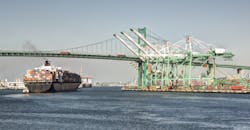As the Port of Los Angeles Expands Hours, Nimble Suppliers Seek Workarounds
During 2020 and 2021, U.S. manufacturers have been battered by a supply-chain tsunami of high shipping volumes, rising transportation prices, labor shortages and delayed deliveries. The Biden Administration’s Task Force on Supply Chain Disruption has been working behind the scenes to improve supply chain performance. Last week, the administration announced three industry commitments designed to reduce bottlenecks and move goods faster:
- The Port of Los Angeles will add off-peak night and weekend open hours, doubling the hours that goods will be available to move off dock. The Port of Long Beach expanded its hours of operation similarly in mid-September.
- The stevedores’ union, the ILWU, agreed to work those extra shifts.
- Walmart, Home Depot, Samsung, Target, FedEx and UPS announced they will use the expanded opening hours to expedite moves of cargo off the dock. This will free up dock space, allowing vessels to berth more quickly at two of the U.S.’s busiest ports.
The ports of Seattle and Tacoma are following suit with their own expanded gate hours.
Will It Help?
Implementation of these steps will take time. Even when fully implemented, the actions alone won’t resolve the current shipping crisis. A flood of imports has swamped every U.S. port, not just Los Angeles and Long Beach. Twenty-nine vessels were at anchor outside the Port of Savannah on Friday. Railcar shortages are delaying deliveries into the interior of the country. The driver shortage impacts local or last-mile deliveries. Warehouses are full or short-staffed, unable to receive merchandise promptly. This causes import freight to stay on the docks too long. Backlogs in receiving also create shortages of containers and chassis.
Still, the announced actions are a welcome and meaningful first step, particularly if additional shippers commit to moving cargo during off-peak hours. Quicker container pick-ups and returns will free up ocean containers and chassis to be used by others. Faster turns free up dock space, improving the productivity of cargo handlers and carriers. Open dock space allows for more incoming containers to be unloaded, allowing vessels to come into berth more quickly. Small, coordinated improvements in each link of the supply chain will yield incremental performance improvements.
Benefiting from the Initiative – What Should Manufacturers Do?
1. Prioritize what is being imported, focusing on smaller high-value items or critical parts which can’t be quickly sourced from domestic suppliers.
2. Optimize inbound planning and decision-making with good transportation information. Ocean carriers have up-to-the-minute information on the situation in each port, including intermodal capacity, dwell times and container and chassis availability. For example, Hapag Lloyd issues a regional report available on its website.
3. To benefit from the new extended open hours, use Los Angeles and Long Beach ports for local deliveries rather than for intermodal destinations.
4. For Midwestern destinations, consider shipping via the Canadian ports of Vancouver or Prince Rupert. These two ports are much less congested than Seattle/Tacoma and move freight in and out quickly. Similarly, goods from Europe to the Midwest can be routed over Montreal rather than New York.
5. Align distribution center operating hours and methods with the updated port practice. Extend receiving hours to synchronize with night or weekend port pickups. Receive live unloads so your drayage provider will have an immediate empty container return that can be swapped for another full container pick up.
6. Communicate closely with your transportation providers, supplying inbound and outbound forecasts and issuing delivery orders in advance of vessel arrival.
7. Anticipate and allow for ongoing cost increases for labor, equipment, facilities and transportation.
Above all else, coordinate your actions with your company’s partners and customers. Properly manage both contractual obligations and expectations. An import gateway is just one link of many in a supply chain that stretches from the port to rail and truck carriers and then on to distribution centers before finally arriving at the consumer’s door.
Lauren Pittelli is the founder and Principal of Baker Logistics Consulting Services, a consulting firm focused on addressing the international trade and transportation needs of industry. Her consulting services focus on 3PL selection and management, international air and sea transportation and customs and trade compliance. Prior to starting Baker, Lauren spent 30 years at leading international freight-forwarding companies managing their transportation, customs and contract logistics business in the Midwest. She is a graduate of Harvard College and a licensed U.S. Customs House broker.
